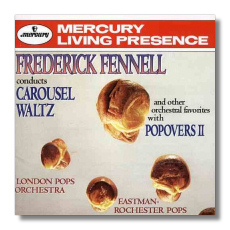
The Internet's Premier Classical Music Source
Related Links
-
Benjamin Reviews
German Reviews
Glière Reviews
Massenet Reviews
Rachmaninoff Reviews
Rimsky-Korsakoff Reviews
Rodgers Reviews
Rossini Reviews
Weinberger Reviews - Latest Reviews
- More Reviews
-
By Composer
-
Collections
DVD & Blu-ray
Books
Concert Reviews
Articles/Interviews
Software
Audio
Search Amazon
Recommended Links
Site News
 CD Review
CD Review
Carousel Waltz & Popovers II

- Richard Rodgers: Carousel - Waltz 1
- Jules Massenet: Le Cid - Aubade & Aragonaise 1
- Giovanni Bolzoni: Minuetto 1
- Edward German: Henry VIII - Three Dances 1
- Arthur Benjamin: Cotillon 1
- Nikolai Rimsky-Korsakoff:
- Snow Maiden - Suite - Dance of the Tumblers 1
- Mlada - Suite - Procession of the nobles 2
- Gioachino Rossini: Guillaume Tell - Pas de six 1
- Sergei Rachmaninoff: Prelude, Op. 23 #5, Alla marcia 2
- Jaromir Weinberger: Schwanda the Bagpiper - Polka & Fugue 2
- Reinhold Glière: The Red Poppy, Op. 70 - Russian Sailors' Dance 2
1 London Pops Orchestra/Frederick Fennell
2 Eastman-Rochester Pops Orchestra/Frederick Fennell
Mercury Living Presence 434356-2 ADD 64:42
Whither the Pops concert? Orchestras still program them, but as popular music changes, so does the composition of the typical Pops concert. Furthermore, these concerts tend to be programmed with a regional consciousness: American Pops concerts focus on American music, English Pops concerts focus on English music, and so on. As a result, much worthwhile "popular" music falls in the cracks as one moves along in time and space.
Consider the contents of this Frederick Fennell CD. When was the last time that you heard Giovanni Bolzoni's Minuet, Edward German's Henry VIII Dances, or Arthur Benjamin's Cotillon Suite ? (Yes, that's the way Benjamin spells it.) Modern American orchestras are unlikely to program these tidbits for their Pops series simply because these tidbits are no longer popular. It's partly a question of conductors and artistic administrators not knowing this music, and it's partly a question of economics: name recognition is important in classical music, just as it is everywhere else.
This reissue shows us some of the things that we've been missing recently as the Pops concert has evolved, particularly in America. The works by Bolzoni, German, and Benjamin are smooth treats and nicely-aged – in my mind, I can almost hear the comforting hiss of a 78-rpm record accompanying them on a Saturday afternoon. This CD also includes short works that still are in the repertoire, such as the "Dance of the Russian Sailors" from Glière's The Red Poppy and the waltz-pantomime (given in its entirety here) from Rodgers and Hammerstein's Carousel. Fennell and his two lusty orchestras sound overjoyed to be playing this music. Rhythms snap like twigs on cold day in winter, but the sunny melodies keep the mood cheerful and warm. For example, listen to the "Aragonaise" from Massenet's Le Cid for a lesson on how to phrase and shape even the tritest tune into something that's infectious. If you want probably intentional vulgarity, try the uncredited orchestration (I don't think it's Lucien Caillet's) of Rachmaninoff's Prélude in G minor – it's perfect for Liza on the ice.
The Eastman selections were taped in 1959, and the London selections were taped in 1965 and have better sound. The popovers pictured on the cover look as delicious; the popovers inside sound delicious too.
Copyright © 1996, Raymond Tuttle



















